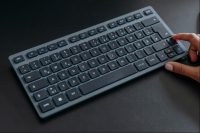(Auszug aus der Pressemitteilung)
SEOUL, Korea, April 28, 2010 – Samsung Electronics Co., Ltd., the world
industry’s first multi-chip package (MCP) with PRAM – for use in mobile
handsets, beginning later this quarter.
The 512 megabit Samsung PRAM in the MCP is backward compatible with 40
nanometer-class* NOR flash memory in both its hardware and software
functionality, allowing mobile handset designers the convenience of having
multi-chip packaging fully compatible with past stand-alone PRAM chip
technology. PRAM is expected to be widely embraced by next year as the
successor to NOR flash in consumer electronics designs to become a major
memory technology.
“Memories for portable consumer devices today are at a major turning point
as mobile applications increasingly require more diverse memory
technologies,” said Dong-soo Jun, executive vice president, Memory Sales
and Marketing, Samsung Electronics. “The launch of our PRAM in an advanced
MCP solution for the replacement of 40nm-class and finer geometry NOR meets
this need head-on. Our PRAM MCP will not only enable handset designers to
utilize conventional platforms, but expedite the introduction of LPDDR2
DRAM and next-generation PRAM technology as the leading-edge basis for
high-performance solutions,” he added.
PRAM, which stores data via the phase change characteristics of its base
material, an alloy of germanium, antimony and titanium, provides
three-times faster data storage performance per word than NOR chips. This
new PRAM-packaged memory combines the nonvolatile nature of flash memory
with the high-speed capability of DRAM. Its simple cell structure makes
designing MCP chips for handsets a faster and easier process, with the
imminent use of 30nm-class and finer process node technology to overcome
long-time design difficulties inherent in NOR flash technology.
As a replacement for NOR, PRAM can more easily accommodate the growing
demand for high-speed, high-density nonvolatile memory in mobile phones and
other mobile applications such as MP3 players, personal multimedia players
and navigational devices.
Samsung is continuing its research and development into PRAM and other
advanced memory chips to enable faster ‘write’ capabilities, a key feature
in taking photo images, providing multimedia messaging and recording video
clips to reduce the standby time in data storage. This high-speed write
capability will be important in a diverse span of digital storage and
consumer devices, such as solid state drives (SSDs) and HDTVs.




Neueste Kommentare
23. April 2024
19. April 2024
17. April 2024
17. April 2024
5. April 2024
23. März 2024